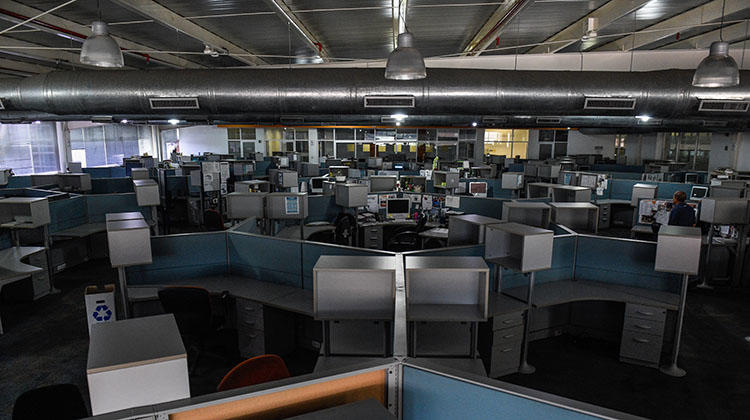When Ewald Scharfenberg, the founding editor of the Venezuelan investigative news website Armando.Info, holds editorial meetings, he pulls out his mobile phone. That’s because most of his reporters are in Venezuela while Scharfenberg lives and works in neighboring Colombia.
He relocated in January 2018 after he and three other Armando.Info editors were sued for criminal defamation over stories published last year that alleged corruption within Venezuela’s state-run food distribution program.
Fearing arrest–criminal defamation carries prison sentences from one to six years–Scharfenberg and his colleagues, Roberto Deniz and Joseph Poliszuk, moved to Bogotá where they now work on borrowed desks and computers in the crowded office of the Colombian newsweekly Semana. A fourth Armando.Info editor, Alfredo Meza, fled to the U.S.
“We did the right thing,” Scharfenberg told CPJ, noting that in July of this year a Caracas judge issued a travel ban to all four journalists.
The Armando.Info team is part of a wider exodus of Venezuelan journalists. Many have gone abroad amid the country’s worst economic crisis in modern history, which has led to critical shortages of food and medicine as well as hyperinflation.
Video: Luz Mely Reyes accepts CPJ’s IPFA
In an interview with CPJ, Laura Weffer, a founding editor of the independent Venezuelan news website Efecto Cocuyo, estimated that in recent years at least 500 journalists have left for the U.S., Europe and other Latin American countries. Luz Mely Reyes, another Efecto Cocuyo co-founder and recipient of CPJ’s 2018 International Press Freedom Award, said she believes the number is closer to 1,000.
They include Weffer, who relocated her family to the Miami suburb of Weston in 2016 after she was unable to find asthma medicine for her daughter in Caracas pharmacies. She said that a WhatsApp group she joined of exiled Venezuelan journalists in the Miami area numbers 33. Weffer added that so many journalists have left that Efecto Cocuyo, which is based in Caracas, has a hard time finding experienced reporters.
“It’s very difficult for journalists to have any aspirations in Venezuela,” Weffer said. Due to hyperinflation “they can’t even consider buying a car or an apartment or replacing a stolen cell phone. After getting home from a long day of reporting there’s no water or electricity and they have to go out and hunt for food.”
But life overseas can also be a grind.
Weffer continues to edit Efecto Cocuyo, but she said that her husband, a video producer, has been unable to find work in journalism and helps make ends meet by driving for Uber. She said that another reporter friend who also relocated to Florida found a job as a janitor at a sports stadium, and another washes cars.
“Most exiled journalists are not doing journalism,” Weffer said. “It’s very sad.”
Other Venezuelan reporters have been driven out amid President Nicolás Maduro’s efforts to control and intimidate the media. CPJ has found that these measures include arbitrary arrests, defamation lawsuits, threats to cancel broadcast licenses, a government monopoly over the importation and distribution of scarce newsprint, and an anti-hate law that mandates prison terms for any one who instigates hate or violence in the media. Authorities also annulled the passports of at least four journalists, thus preventing them from leaving, according to reports.
Among the most prominent of the exiles are Miguel Henrique Otero, editor of the independent Caracas daily El Nacional–which announced this month that it will be available online only because of newsprint shortages–and Alberto Ravell, a former TV executive and founder of the news aggregator La Patilla.
Otero and Ravell left Venezuela after being sued for defamation in 2015 by Diosdado Cabello, a top government official. The lawsuit stems from a January 2015 story in the Madrid-based daily El País – reprinted by El Nacional, La Patilla, and the Caracas daily Tal Cual – that alleged Cabello had ties to drug traffickers, an allegation he denies. CPJ documented how in May 2015, a court barred Otero, Ravell and 20 other journalists, editors, and media company shareholders from leaving the country until the case is settled. As of December 6, the case was ongoing.
“There is no doubt that legal harassment is forcing journalists to leave the country,” Carlos Correa, director of Espacio Público, a Caracas-based free speech organization, told CPJ.
Calls by CPJ to Venezuela’s information ministry were not returned.
Still, many of the exiled journalists continue to speak up. Otero and Ravell remain deeply involved in their news organizations.
Armando.Info still publishes hard-hitting investigations, including a series on Venezuelan officials who allegedly accepted bribes from the Brazilian construction firm Odebrecht. Last month, Poliszuk, the website’s editor-in-chief, received the Knight International Journalism award in Washington, D.C. for its series on alleged fraud within the state-run food distribution program.
“This is our work and we want to keep doing it,” said Deniz, who was named in the lawsuit over the food distribution series and who left behind his girlfriend in Caracas to work for Armando.Info in Bogotá. “But it has come at a great personal cost.”
Scharfenberg said he was frustrated that no action was taken over corruption exposed by Armando.Info. “The only consequence is that we have had to leave the country,” Scharfenberg said.
But he’s found some advantages to life in exile. In Venezuela, Scharfenberg had to spend about four hours a day looking for food, medicine, and other scarce items. Now, he said, he dedicates that time to investigative journalism.
